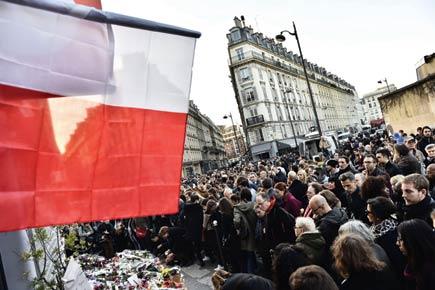In India there are more chances of being struck down by a speeding car or a train crash than a terror incident. Approximately, one death occurs every four minutes on Indian roads

 In India there are more chances of being struck down by a speeding car or a train crash than a terror incident. Approximately, one death occurs every four minutes on Indian roads. But that doesn’t strike as much fear in our hearts as being blown to bits by a suicide bomber or gunned down while at a music concert or while sipping soup in a restaurant.
In India there are more chances of being struck down by a speeding car or a train crash than a terror incident. Approximately, one death occurs every four minutes on Indian roads. But that doesn’t strike as much fear in our hearts as being blown to bits by a suicide bomber or gunned down while at a music concert or while sipping soup in a restaurant.
ADVERTISEMENT

People gather at a makeshift memorial in front of the restaurant, Le Carillon, one of the attack sites in Paris on November 15. Pic/AFP
A friend posted on her Facebook page of how she read about the Paris attacks on social media and went about the next few hours thinking how horrific it all was, when suddenly, it struck her that her husband, a frequent flier, was in Paris and was planning to go out at night to see the city. She frantically tried to get in touch with him and was reassured that he was fine.
How many of us did the same during the Mumbai attacks of 26/11, during the 7/11 London bombings, during 9/11, and the several other terror attacks in India and abroad, including Paris 13/11. Call up parents, children, cousins, friends…. Are you okay? Those crucial three words.
We really don’t take security seriously in India, despite living in a volatile neighbourhood. Pakistan is the incubator of the world’s terror organisations. Afghanistan, Bangladesh, Maldives, Myanmar, Sri Lanka — all neighbouring countries, battling violent extremist cults threatening civilian populations within and outside.
Our cities and towns are vulnerable to terror attacks of the scale that we have seen over the last week. Yet, it is common for CCTV cameras to malfunction in public places, people walk around metal detector gates in gay abandon, cops stationed to view X-ray machines at airports have often been seen checking their cell phones instead of the monitors, fences are breached by those who find it tiresome to go through security checks. It is almost fatalistic, the way we go about our lives hoping that the government has our backs.
It’s as if Mumbai has not taught us anything. The 26/11 strikes have become the go-to manual for terror organisations for high-impact, low-cost operations. France strikes of 13/11 were almost a copycat act.
But in India, nobody wants to talk of terrorism or security anymore. It’s tiresome. The massive plans drawn up by several ministries and security experts post 26/11 have got lost in the corridors of power, cabinet reshuffles of the UPA-II and finally, the change in government. Reporters also stopped chasing the story of the massive revamp of security that was supposed to happen — NATGRID (National Intelligence Grid) and all. It will all come up again when the — God forbid — next big strike happens.
Better to talk about ‘award wapasi’ or ‘rising intolerance’. It’s a single-agenda-driven debate in the media. If it’s one topic that catches the imagination, then every channel, newspaper and news website obsesses only about that. So much so that, when a reporter asked Prime Minister Modi a question on anti-terror cooperation with the UK, some in the Indian media sniggered that he should instead have continued in the same vein as the BBC and Guardian reporters and put the PM on the mat on ‘Intolerant India’ and ‘Gujarat 2002’. The irony is that what was dismissed as inconsequential, was so on the ball barely a few hours later. The Paris attacks happened and Prime Minister Modi’s remarks on terrorism were played out as pertinent and timely.
It has been a deadly week. On Thursday night, one of the most ghastly terror attacks in Beirut in years left 43 people dead and 250 injured in a double suicide bombing. On Friday, an ISIS militant blew himself up at a funeral in Baghdad, killing 18 and wounding 41. And then the Paris terror strikes, resulting in the death of 120 in six attacks. France has moved to seal its borders in an unprecedented move since the EU open-border policy of 1995, wherein 26 countries abolished checks at internal borders allowing passport-free movement among countries.
That arrangement is now coming under stress with counter-terror experts demanding restrictions on the entry of foreigners. European countries are already talking of an undeclared ‘secret war’, which involves undercover cops, former military personnel and retired intel operators finding jihadi groups, on or offline, who could be potential terrorists.
With the ISIS spreading its footprints in all corners of the globe, it is time for extraordinary steps to prevent horror attacks similar to the one in Paris. And no country wants to be seen wanting in taking such measures. Eyes now on the Modi government to see what steps it takes to keep India safe.
Smita Prakash is Editor, News at Asian News International. You can follow her on Twitter @smitaprakash
 Subscribe today by clicking the link and stay updated with the latest news!" Click here!
Subscribe today by clicking the link and stay updated with the latest news!" Click here!






